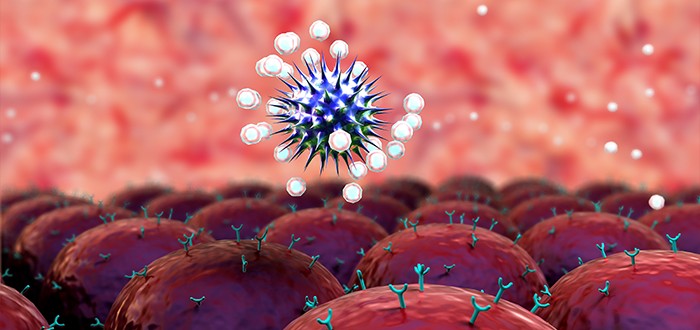A late-stage cancer immunotherapy vaccine that targets the WT1 antigen appears to have worked well for mesothelioma patients enrolled in a Phase 2 clinical trial. They experienced a median overall survival rate of 21.4 months.
This WT1 cancer vaccine also allowed the enrolled mesothelioma patients to enjoy a median progression-free survival of 11.4 months — double that of the patients in the study’s control group.
These findings were presented in mid-November at the International WT1 Conference held in Japan.
The mesothelioma vaccine’s co-inventor David A. Scheinberg, M.D., Ph.D., gave the presentation. He is the chairman of the Molecular Pharmacology Program and Center for Experimental Therapeutics at Memorial Sloan Kettering Cancer Center in New York City.
WT1 Is a Target in Mesothelioma Immunotherapy
WT1 is the name of an antigen ranked by the National Cancer Institute as the richest vein for potential discoveries in the field of cancer immunotherapy.
The WT1 antigen is what’s known as a transcription factor. Although seldom expressed in normal adult cells, it shows up routinely in mesothelioma and other cancers – even some cancer stem cells.
WT1 refuses to raise the white flag when bombarded directly by drugs. But it will surrender if attacked indirectly, by using drugs that target the immune system.
According to Scheinberg, the WT1 antigen contains a number of immunogenic peptide sequences that can be coaxed into attracting cytotoxic T cells.
Scheinberg’s WT1 vaccine is made up of four lab-modified peptide chains. Together they induce a strong innate immune response from T cells of the CD4+/CD8+ variety.
The WT1 vaccine simply paints a target on the mesothelioma cells that express the WT1 antigen. This makes it easy for the T cells to zero in on it and open fire.
Scheinberg and his research colleagues discovered that the immune response to the target is intensified if mesothelioma patients receive the WT1 vaccine with an adjuvant treatment plus an immune modulator.
This observation has led the research team to speculate that the WT1 vaccine might make a powerful complement to surgery and chemotherapy.
The ultimate value of the WT1 vaccine in such a role would be to search for and destroy tumor cells left behind by the surgery or not completely knocked down by the chemotherapy.
The researchers also say they are confident that the WT1 vaccine could be effective against more than 20 other cancers besides mesothelioma.
One of these other cancers is acute myeloid leukemia. The WT1 vaccine is being tested on it in tandem with the mesothelioma clinical trials. Equally favorable results are being seen.
Mesothelioma Vaccine Study Slated
During the now-completed Phase 2 clinical trial of the WT1 vaccine, 40 patients were enrolled at Memorial Sloan Kettering Cancer Center and another 40 at MD Anderson Cancer Center in Houston.
The researchers are now planning to move on to a Phase 3 clinical trial. It is expected to get underway by this coming summer.
Like the Phase 2 clinical study, Phase 3 will be double-blinded and placebo-controlled. It will be conducted at more than one research center and in more than one country.
The objective is to further assess the vaccine’s safety and effectiveness, according to the company that owns the rights to the vaccine — SELLAS Life Sciences Group in Zug, Switzerland.
SELLAS is a development-stage biopharmaceutical company focused on innovative products to treat cancers and central nervous system diseases.
“As the WT1 program further accelerates, we continue to be very excited with the results and the additional validation achieved through our work with our key collaborators,” said SELLAS Chairman and CEO Angelos M. Stergiou, M.D.

